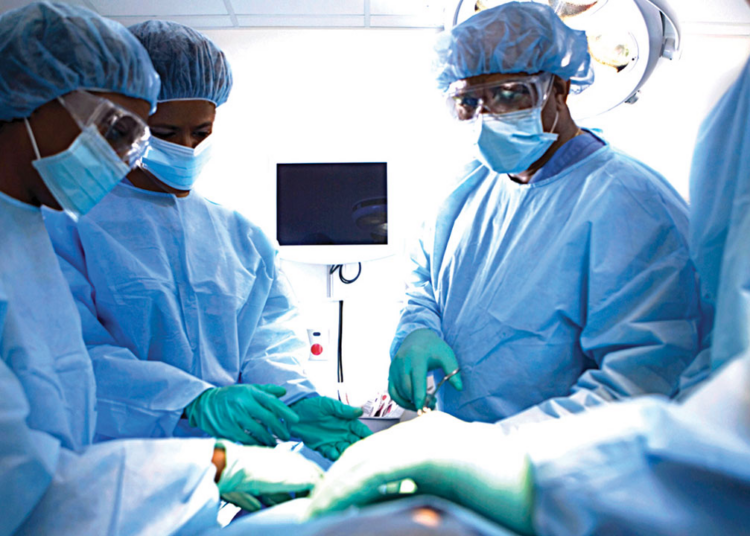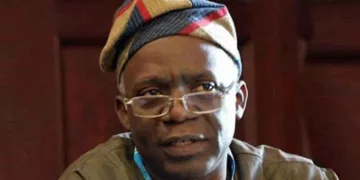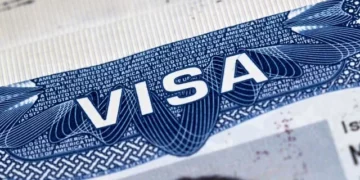Nigerian medical experts and specialist hospitals are making significant strides in kidney treatment and transplants.
Their success rate and cheaper treatment costs are now attracting patients from developed countries.
LEADERSHIP Sunday recalls that the coordinating minister of health and social welfare, Dr Muhammad Ali Pate, had stated in a recent television interview that Nigeria’s health system had improved significantly and that foreigners were now coming to the country for health care.
An investigation carried out by LEADERSHIP Sunday showed that hospitals performing kidney transplants in the Federal Capital Territory (FCT) and Lagos have become major destinations for patients from the United States (US), the United Kingdom (UK), Canada, and India.
There are also centres in some university teaching hospitals in Lagos, Kano, Sokoto, Ekiti, Rivers, and Abia states that perform kidney transplants.
It was learnt that high-tech-driven private hospitals handle more patients than their public counterparts.
LEADERSHIP Sunday findings revealed that Abuja, the nation’s capital, is home to three major kidney transplant centres: Alliance Hospital, Zenith Medical & Kidney Centre, and Caroline Medical Centre. These three facilities provide life-saving kidney transplant services to both local and international patients.
One of the facilities, Alliance Hospital, launched its kidney transplant programme in 2017 and has since performed over 100 transplants.
According to the hospital’s medical director, Dr. Christopher Otabor, a significant number of the patients come from outside Nigeria.
“Almost 20 per cent or more of our patients are international,” he said, adding that most foreign patients come from the US, UK, India, Canada, and other countries.
Otabor explained that the reasons foreign patients choose Nigeria for kidney transplants vary by country.
He cited India as an example, where strict legal restrictions on kidney donations allow only blood relatives to legally donate a kidney.
According to him, many Indian patients who have non-relative donors travel to Nigeria, where such transplants are not prohibited.
Medical experts noted that many UK-based patients, especially Nigerians living abroad, return to Nigeria due to the high transplant costs and long waiting lists in the UK.
He added that some do not have insurance coverage, making an overseas transplant a more viable option.
“Those from India often bring donors who are also Indians but are not blood relatives. That would be illegal in India, but Nigeria has no such law preventing the transplant. After two or three weeks, they return home with their donors,” he explained.
“For UK patients, the cost and waiting time are the main issues. They come with their relatives who serve as donors, undergo the transplant, and then return home,” Otabor added.
According to him, the hospital has recorded an over 85 per cent success rate in kidney transplants.
Otabor, however, identified financial barriers as the major challenge for Nigerian patients.
“Many Nigerians need transplants but cannot afford them. The high cost is mainly due to medications. Previously, some of these drugs were manufactured locally, but the companies have shut down, forcing us to import expensive immunosuppressive medications,” he stated.
According to him, patients must take post-transplant medications to prevent organ rejection.
“Some patients spend as much as N300,000 per month in the initial stages, while others manage with around N100,000, depending on the brand of medication,” he said.
Unfortunately, he noted that some patients struggle to sustain treatment after the transplant.
“Many rely on crowdfunding or loans to afford the transplant, but after a few months, they run out of money and stop taking their medications. This exposes the new kidney to immune attacks, leading to rejection and, ultimately, failure.”
Dr. Otabor also identified another major challenge: finding suitable donors.
“Last month, we had to cancel a transplant because the patient’s blood did not match, and they couldn’t find another donor. Finding a matching live donor is not easy,” he said.
Beyond medical challenges, Dr. Otabor noted that Nigeria also lacks a comprehensive legal framework to regulate organ transplants.
“Right now, there is no detailed law guiding kidney transplants in Nigeria. Hospitals operate based on their own policies, in line with the National Health Act 2014, which only briefly addresses organ transplants. The National Assembly (NASS) needs to establish a more detailed legal framework,” he emphasised.
He stated that the average cost of a kidney transplant in the country is about $15,000 (N25–N30 million), including additional expenses.
“If you follow the standard protocol and administer the right dose of transplant medications, it gets very expensive. In some cases, the cost of medication alone can reach N10 million,” Dr. Otabor revealed.
LEADERSHIP Sunday gathered that from the year 2000 to 2018, over 1,000 kidney transplants were performed in Nigeria, yet the demand for renal care continues to grow, with approximately 18,000 Nigerians requiring dialysis annually.
Despite the increasing prevalence of End-Stage Renal Disease (ESRD), the country has only 160 nephrologists to cater for these patients, highlighting a critical shortage of specialists and healthcare infrastructure.
Medical experts assert that kidney transplantation remains the most effective treatment for ESRD, offering a better quality of life than dialysis. However, access to transplants remains limited due to financial constraints, a lack of organ donors, and inadequate medical facilities.
A consultant nephrologist and clinical director at St. Nicholas Hospital (SNH), Dr. Ebun Bamgboye, revealed that St. Nicholas was the first hospital in Nigeria to perform a successful kidney transplant, followed by Aminu Kano University Teaching Hospital (AKUTH) and Obafemi Awolowo University Teaching Hospital (OAUTH).
Since its inception in the country, the clinical director said SNH has carried out over 500 transplants, followed by Zenith Medical & Kidney Centre (ZMKC), with over 1,000 dialysis sessions and 10-12 kidney transplants monthly.
Bamgboye stated that from 2000 to 2018, AKUTH had completed 35 kidney transplants; Garki Hospital, Abuja, 23; OAUTH, 15; University College Hospital (UCH), Ibadan, 5; and Lagos University Teaching Hospital (LUTH), 4.
Others include Lagos State University Teaching Hospital (LASUTH), 4; Federal Medical Centre (FMC), Umuahia, 4; Delta State University Teaching Hospital (DELSUTH), 2; University of Ilorin Teaching Hospital (UITH), 1; University of Maiduguri Teaching Hospital (UMTH), 1; and Babcock University, 1.
Despite these efforts, Nigeria still falls short in meeting kidney transplant demand.
For instance, one of the significant barriers to kidney transplantation in Nigeria is the high cost.
According to a report by SURJEN, the cost of a kidney transplant in the country ranges from N25 million to N30 million ($15,000 – $20,000), depending on the hospital, surgeon’s expertise, and post-transplant care.
While this cost is lower than in countries like the US, United Arab Emirates (UAE), or India—where kidney transplants cost between $25,000 and $150,000—it remains out of reach for most Nigerians.
A nephrologist, Ajibike Shanu Omolola, told LEADERSHIP Sunday that 18,000 Nigerians need dialysis yearly, but only 160 nephrologists are available in the country to treat them.
Omolola therefore advocated for kidney transplantation, saying it is key to reducing the morbidity and mortality rates of patients with End-Stage Renal Disease (ESRD) to the barest minimum.
She said kidney transplantation is the best approved renal replacement therapy, adding that the biggest limitation remains the general shortage of organ donors, not only in terms of absolute numbers but particularly regarding preservation techniques.
The nephrologist called for increased awareness and advocacy on kidney donation, emphasising that a person can live a normal, healthy life with one kidney.
“Kidney transplantation should not be feared. It is a life-saving procedure, and more Nigerians should be encouraged to donate,” she stated.
She urged the government and non-governmental organisations (NGOs) to provide financial support to kidney patients, just as she called for policies to regulate organ donation, increase awareness, and improve access to kidney transplantation in Nigeria.
LEADERSHIP Sunday learnt that Aminu Kano Teaching Hospital (AKTH) was the first teaching hospital in the North to commence kidney transplants in 2002.
According to the hospital’s kidney transplant coordinator, Bashir Ahmad, the first case, sponsored by a Kano philanthropist, was carried out by an Egyptian doctor and observed by the facility’s urologists.
He explained that since then, the facility has periodically performed kidney transplants based on the influx of patients, noting that it has successfully carried out more than 150 renal transplants on Nigerian patients alone.
“When we started in 2002, the transplant fee was N2.5 million; we upgraded later to N3.5 million, N5 million, and currently, due to the rise in the dollar, kidney transplantation is estimated at the cost of N10 million with a blood-related donor.”
Meanwhile, the TETFUND Centre of Excellence in Urology and Nephrology at Usmanu Danfodiyo University Teaching Hospital (UDUTH), Sokoto, made history on February 3, 2025, when it successfully performed its first-ever kidney transplant.
Sources within UDUTH confirmed that both the donor and recipient are in stable condition and responding well to post-operative care.
The groundbreaking procedure was performed by a team of highly skilled medical professionals using a comprehensive and multidisciplinary approach, with support from the University of Mansoura and the University of Alberta, Canada.
UDUTH is the first of TETFUND’s 27 medical centres nationwide to successfully initiate a kidney transplant, which the chief medical director, Professor Anas Sabir, promised to sustain and expand its reach to more patients.
In Ekiti State, Afe Babalola University Multi-System Hospital (AMSH), Ado-Ekiti, has joined the league of hospitals to successfully perform kidney transplants.
So far, the facility has conducted 18 transplants since October 2021 when its first renal transplant was carried out.
The hospital’s chief medical director, Dr. Kolawole Ogundipe, told LEADERSHIP Sunday in Ado-Ekiti that apart from kidney transplants, the Renal Unit now performs over 400 dialysis treatment sessions monthly, up from the initial 10.
While stating that most of the AMSH kidney transplant patients are Nigerians, he said they were reviewing cases of foreign patients who have expressed interest in receiving care at AMSH.
“We currently have patients being prepared for surgery in the coming weeks,” he said.
The CMD identified the poor condition of the roads leading to the hospital as one of its major challenges.
“Rising costs of medical and surgical consumables required for kidney transplantation, occasioned by government policies affecting importation, high import duties, taxes, and rising inflation, make it difficult to procure essential medical supplies. The cost of utilities, particularly electricity, is also a major burden on hospitals, further increasing operational expenses,” he lamented.
Ogundipe called on the government to consider reducing taxes and customs duties on medical and surgical consumables.
“Establishing dedicated financial support schemes for patients requiring kidney transplants would also significantly improve access to care. Furthermore, reconstructing the roads leading to AMSH would enhance accessibility, benefitting not just our hospital but the entire regional healthcare system,” he said.
In Port Harcourt, Rivers State, Save-A-Life Hospital is currently the only hospital offering kidney transplants in the state.
The hospital, which is privately owned and located in the Rumuomasi area of Port Harcourt, boasts other state-of-the-art medical equipment.
LEADERSHIP Sunday’s efforts to speak with the facility’s management were futile, as our correspondent’s several visits to the hospital met a brick wall. A hospital staff member, who pleaded for anonymity, said the hospital started performing kidney transplants in 2024 after installing the necessary equipment in 2023.





